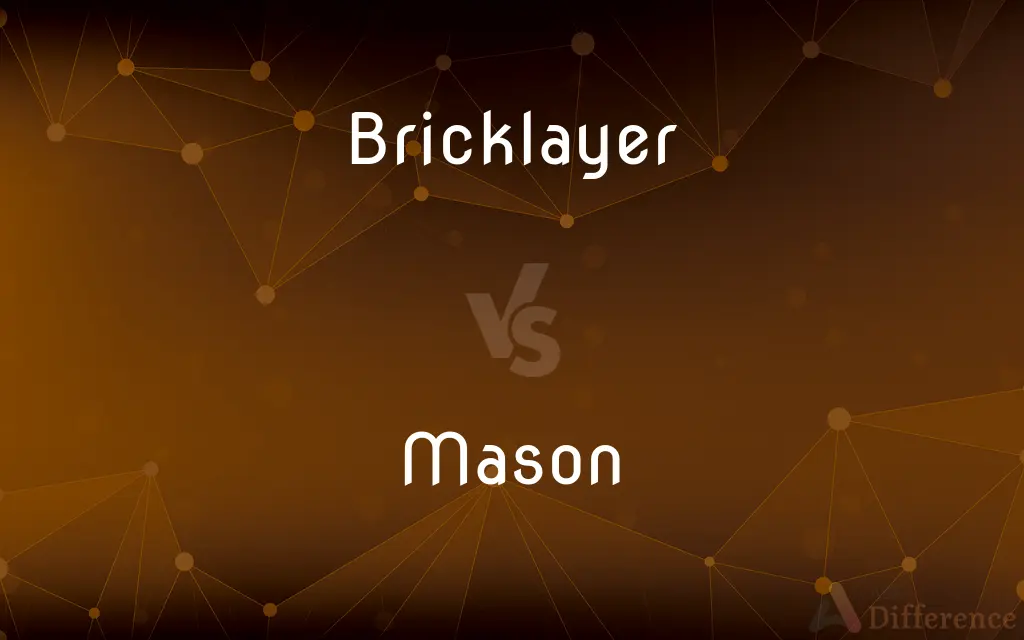Bricklayer vs. Mason — What's the Difference?
By Maham Liaqat & Urooj Arif — Updated on March 14, 2024
A bricklayer specializes in working with bricks, focusing on laying bricks in construction projects, whereas a mason is skilled in working with various building materials, including bricks, stones, and concrete blocks.

Difference Between Bricklayer and Mason
Table of Contents
ADVERTISEMENT
Key Differences
Bricklayers specifically work with bricks to construct brickwork, which includes walls, chimneys, and other structures primarily made of bricks. They utilize mortar to bind the bricks together, creating various patterns and structures. On the other hand, masons have a broader skill set, encompassing the ability to work with stone, concrete blocks, and bricks. Masons can construct a wider variety of structures, including stone walls, patios, and intricate brick or stone facades.
While bricklayers focus on the aesthetic and structural aspects of laying bricks in a uniform and appealing manner, masons must also understand the properties and aesthetics of different materials like natural stone and concrete. This knowledge allows masons to choose the right material for a particular project, considering durability, weather resistance, and visual appeal. Masonry work often requires more complex planning and design, especially when incorporating different materials and techniques in a single project.
The tools and techniques used by bricklayers and masons differ due to the variety of materials masons work with. Bricklayers primarily use trowels, levels, and string lines to ensure bricks are laid evenly and bonds are strong. Masons, in addition to these tools, may use chisels, hammers, and specialized cutting tools to shape stones and other materials to fit specific designs and spaces.
Education and training paths for these trades can vary. Bricklayers might complete apprenticeships focusing solely on brickwork, mastering patterns, and techniques specific to bricks. Masons often undergo more extensive training, which includes learning to work with various materials and mastering a broader range of techniques to accommodate the diversity of masonry work.
Though both trades share some foundational skills, such as understanding mortar mixing and application, the scope of their work and the complexity of the projects they undertake can differ significantly. Bricklayers might specialize further within their trade, focusing on historical restoration or custom brickwork designs, while masons might develop expertise in specific types of stonework or in combining materials for unique architectural features.
ADVERTISEMENT
Comparison Chart
Materials Used
Primarily bricks.
Bricks, stones, concrete blocks.
Scope of Work
Focuses on laying bricks for walls, chimneys, and other brick structures.
Constructs a wider variety of structures, including walls, patios, and facades using various materials.
Skills and Techniques
Specialized in bricklaying patterns and mortar application.
Broad skill set including shaping, setting different materials, and complex design implementation.
Tools Commonly Used
Trowels, levels, string lines.
Trowels, levels, chisels, hammers, cutting tools.
Training and Education
Apprenticeships focused on brickwork.
More extensive training covering various masonry materials and techniques.
Compare with Definitions
Bricklayer
A craftsman specializing in laying bricks to construct brick structures.
A bricklayer expertly laid the bricks for our new fireplace.
Mason
A skilled worker capable of constructing structures using bricks, stones, and concrete blocks.
The mason crafted a beautiful stone wall around the garden.
Bricklayer
Often involved in residential and commercial building projects.
We hired a skilled bricklayer for the construction of our brick veneer home.
Mason
Can work on a wide range of projects, from simple walls to intricate facades.
The mason created an impressive facade combining bricks and natural stone.
Bricklayer
Uses specific tools like trowels and levels for precise work.
The bricklayer used a string line to keep the courses of bricks straight.
Mason
Often has extensive training to master working with multiple building materials.
The skilled mason has years of experience in both stone masonry and bricklaying.
Bricklayer
Focuses on the aesthetic alignment and structural integrity of brickwork.
The bricklayer ensured the wall was perfectly level and strong.
Mason
Requires knowledge of different materials and techniques for diverse projects.
Our mason recommended using limestone for the patio for its durability.
Bricklayer
May work on restoration projects to repair or replicate historical brickwork.
A bricklayer restored the damaged brick facade of the historic building.
Mason
Utilizes a variety of tools to cut, shape, and set materials.
The mason used a chisel to shape the stones perfectly.
Bricklayer
A bricklayer, which is related to but different from a mason, is a craftsman and tradesman who lays bricks to construct brickwork. The terms also refer to personnel who use blocks to construct blockwork walls and other forms of masonry.
Mason
One who builds or works with stone or brick.
Bricklayer
One who builds with bricks.
Mason
Mason A Freemason.
Bricklayer
A craftsman who builds walls and suchlike out of bricks.
A good bricklayer should be able to calculate the number of bricks needed to build a wall.
Mason
To build of or strengthen with masonry.
Bricklayer
One whose occupation is to build with bricks.
Mason
A bricklayer, one whose occupation is to build with stone or brick
Bricklayer
A craftsman skilled in building with bricks
Mason
One who prepares stone for building purposes.
Mason
A member of the fraternity of Freemasons. See Freemason.
Mason
To build stonework or brickwork about, under, in, over, etc.; to construct by masons
To mason up a well or terrace
To mason in a kettle or boiler
Mason
One whose occupation is to build with stone or brick; also, one who prepares stone for building purposes.
Mason
A member of the fraternity of Freemasons. See Freemason.
Mason
To build stonework or brickwork about, under, in, over, etc.; to construct by masons; - with a prepositional suffix; as, to mason up a well or terrace; to mason in a kettle or boiler.
Mason
American Revolutionary leader from Virginia whose objections led to the drafting of the Bill of Rights (1725-1792)
Mason
English film actor (1909-1984)
Mason
English writer (1865-1948)
Mason
A craftsman who works with stone or brick
Mason
A member of a widespread secret fraternal order pledged to mutual assistance and brotherly love
Common Curiosities
Can a bricklayer work on stone projects?
Typically, a bricklayer specializes in brickwork, so stone projects would usually be handled by a mason.
Is the training for a bricklayer different from that of a mason?
Yes, bricklayers focus on bricklaying techniques, while masons receive broader training that covers various materials and more complex constructions.
Can a mason replace a bricklayer?
A mason can perform the work of a bricklayer, given their broader skill set, but for specialized brickwork, a skilled bricklayer might be preferred for their expertise.
What kind of tools does a bricklayer use?
Bricklayers use tools such as trowels, levels, and string lines to lay bricks evenly and ensure structural integrity.
What differentiates a bricklayer from a mason?
A bricklayer specializes in working with bricks, whereas a mason works with a variety of materials, including stone and concrete blocks.
What are some common projects for masons?
Masons can work on a variety of projects, including stone walls, brick facades, patios, and even intricate artistic structures.
Which is more expensive to hire, a bricklayer or a mason?
Costs can vary based on the project complexity and the materials used. Masons might charge more for projects involving multiple materials and intricate designs.
What is the most challenging aspect of being a bricklayer or mason?
One of the challenges includes mastering the skills to work precisely and efficiently with different materials and in various construction scenarios.
Do bricklayers and masons work together on projects?
Yes, on large construction projects, bricklayers and masons might work together, each focusing on different aspects of the project.
How long does it take to become a skilled bricklayer or mason?
Apprenticeships and training can last several years, depending on the complexity of the skills being learned and the level of expertise desired.
Can bricklayers and masons work in all weather conditions?
Work can be affected by extreme weather, but both trades often find ways to adapt, such as using tents or temporary shelters.
What are the career prospects for bricklayers and masons?
Both trades have good career prospects, especially in areas with ongoing construction and restoration projects.
Are there any certifications required for bricklayers or masons?
While not always required, certifications can demonstrate expertise and may be preferred by employers.
Share Your Discovery

Previous Comparison
Overrun vs. Underrun
Next Comparison
Grassland vs. FieldAuthor Spotlight
Written by
Maham LiaqatCo-written by
Urooj ArifUrooj is a skilled content writer at Ask Difference, known for her exceptional ability to simplify complex topics into engaging and informative content. With a passion for research and a flair for clear, concise writing, she consistently delivers articles that resonate with our diverse audience.















































